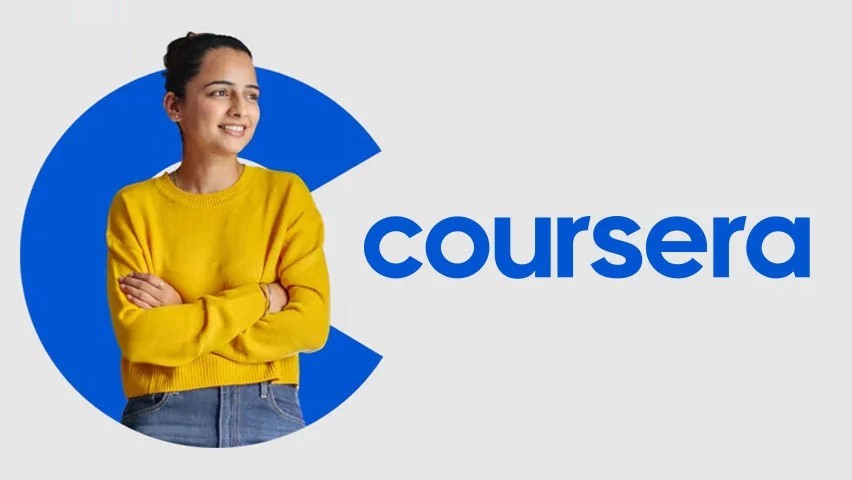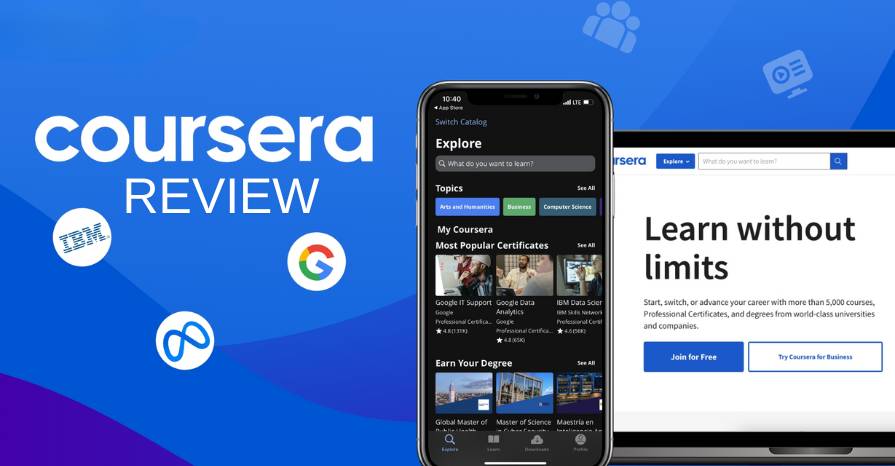In the swirling digital vortex, the necessity of perpetual learning echoes loudly, with platforms like Coursera at the helm, offering a digital cornucopia of academic riches. Coursera review, with its promise of democratizing access to the ivy-covered walls of prestigious institutions, beckons learners to its digital shores.
But in a sea swelling with online educational offerings, the pivotal query looms: Can Coursera justify the expenditure of both your clock ticks and coin? This review delves deeply into the essence of Coursera’s portfolio, furnishing you with the requisite insights to forge an educated verdict.
What’s in this article?
What is Coursera?
Sprung from the minds of academia at Stanford in 2012, Coursera is a colossus in the realm of online learning, partnering with the upper echelons of global universities. The brainchild of Andrew Ng and Daphne Koller, Coursera’s crusade is to fling open the gates of high-caliber education to the masses.
Presently, it stands as a bustling nexus for millions of intellects, offering a gamut from fleeting courses to full-fledged degrees in disciplines as diverse as philosophy and particle physics.
How does Coursera work?
Coursera’s interface, a paragon of user-friendliness, allows learners to navigate through an eclectic array of courses, spanning weeks to months. The learning journey is peppered with video lectures, interactive assessments, and peer collaborations, culminating occasionally in capstone projects or examinations.
While the asynchronous nature of most courses gifts learners the liberty to chart their learning schedules, synchronous options are also available for real-time engagement. Achievement badges in the form of certificates await those who emerge victorious, ready to be flaunted on professional platforms like LinkedIn.

Why Use Coursera?
Coursera stands as a beacon for myriad learners: professionals seeking growth, scholars aiming higher, and individuals hungry for personal enrichment. Its allure lies in the direct transmission of knowledge from renowned educators, the acquisition of certificates that carry weight in the professional realm, and access to a treasure trove of resources. The collaboration with leading institutions ensures that the curriculum isn’t just vast but also vibrant with contemporary relevance and rigor.
What Types of Courses Does Coursera Offer?
Coursera’s arsenal boasts over 4,000 courses, encompassing niche topics like philosophy to burgeoning fields such as data science. The offerings are segmented into individual courses, Specializations (a series aimed at deepening expertise in a particular subject area), Professional Certificates (geared towards career advancement or transition), and fully accredited undergraduate and graduate degrees. This diversity ensures that Coursera caters to a plethora of learning preferences and needs.
How to Use Coursera
Embarking on the Coursera journey is as simple as signing up, selecting a course, and diving into learning. Each course is self-contained, with all materials provided. For a more immersive experience, community forums are available for learners to exchange ideas and insights, thereby enriching the educational journey.

What Makes Coursera Stand Out From the Competition?
Coursera’s faculty roster is adorned with academics from over 200 esteemed institutions, who not only teach but also contribute cutting-edge research to their fields. This direct pipeline to pioneering knowledge makes Coursera a beacon for those in pursuit of advanced professional training.
Pros and Cons of Coursera
Pros
- High-Quality Education: Courses at prestigious universities and businesses.
- Flexibility: Learn at your own pace and schedule.
- Accessible: Free course audits and financial aid are available.
- User-Friendly Platform: Easy to navigate with engaging content.
Cons
- Cost: Certification and degree programs can be expensive.
- Variable Quality: Course quality can vary by instructor.
- Technical Issues: Some users experience platform-related problems.
Who teaches at Coursera?
The teaching roster at Coursera is a who’s who of academia, featuring luminaries from over 200 revered institutions globally. These educators are not just disseminators of knowledge but are active frontier researchers, bringing fresh, groundbreaking insights directly into their courses, thus making Coursera a goldmine for those in pursuit of advanced knowledge and professional upskilling.
How much does Coursera cost?
Coursera’s economic model is flexible. Many courses offer a free auditing option, which includes all lectures and discussions but excludes certificate issuance and full material access. For a more formal acknowledgment of course completion, fees range from $49 to $99.
Specializations and professional certificates operate on a subscription basis, while degree programs, reflecting their comprehensive and accredited nature, command fees between $15,000 and $45,000.
Who is Coursera for?
Securing a degree via Coursera garners you a credential from the affiliated university, identical in stature and recognition to those conferred to on-campus pupils. This blend of traditional academic rigor with flexible learning modalities makes Coursera’s degrees particularly appealing for those who need to balance life’s various demands.
What are the alternatives to Coursera?
Coursera navigates a crowded marketplace with contenders like edX, Udacity, LinkedIn Learning each offering unique educational paradigms. Prospective learners would do well to weigh these alternatives against their learning styles, budget constraints, and professional aspirations. Learners should weigh these options against their personal learning preferences and financial capacities.
Is it worth it?
The true value of Coursera hinges on individual goals and preferences. For those who value flexible learning arrangements, a diverse array of course options, and credentials from acclaimed universities, Coursera is certainly worth considering. However, potential users must also balance the costs against their financial outlay and the prospective returns in terms of career enhancement or personal fulfillment.
FAQs
Q: Can I access courses offline?
Ans: Yes, with the Coursera app.
Q: Does Coursera offer financial aid?
Ans: Yes, for eligible learners.
Q: What languages are available?
Ans: Courses in multiple languages; subtitles are often available.
Q: Is there a trial period?
Ans: Some courses offer a 7-day free trial with Coursera Plus.
Q: Can I share my certificate?
Ans: Yes, on LinkedIn and resumes.
Q: What if I need help?
Ans: Customer support is available via the website and app.
Final Verdict : Coursera Review
Coursera presents a robust platform for accessing diverse, high-quality educational content and expert instruction. It offers an invaluable resource for anyone aiming to elevate their educational or professional trajectory. As with any investment, aligning Coursera’s offerings with your specific educational and professional goals is key to maximizing its benefits.

